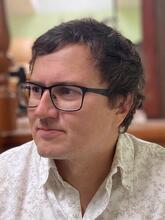CCS Faculty Fellow and acting Associate Director Dmitry Kurakin has published “Narratives we live by: sequentiality and timeliness in temporal structuring of action,” in Theory and Society , available online now!
Abstract: Cultural structures can organize experience either independently of time—‘transversely’ to its flow—or temporally—‘longitudinally’ along it. Most existing concepts—binaries, codes, norms—represent the former. Temporal structuring is much less theorized. While sociologists frequently invoke ‘narratives,’ they often use the term loosely, as a more evocative synonym for beliefs or values (e.g., ‘ecological narrative’). Recent work in pragmatism and interactionism has reintroduced temporality into theories of action. I argue, however, that further progress is hindered by the ‘aporia of time’—the enduring difficulty of simultaneously accounting for subjective and objective time. To address this problem, I adopt Ricoeur’s solution and extend it by introducing timeliness as a dimension of narrative. While narratives are typically understood as sequences of segments, timeliness captures how the duration of those segments also shapes meaning-making. It ties narrative to both the inner flow of time and social time—producing harmony or dissonance (e.g., ‘untimely,’ ‘premature,’ etc.). This helps us understand how the narratives we live by—such as the ‘American Dream’—structure our actions and our sense of temporal movement. I explore this theoretical innovation through an empirical case of educational decision-making. Using longitudinal data from Russia, I examine a puzzling pattern: vocational-track students often revise their plans mid-course. I show that this shift results from a temporal conflict between the unfolding meta-narrative of ‘coming-of-age’ they often employ and the pressures of real-life time.
Congratulations, Dmitry!
